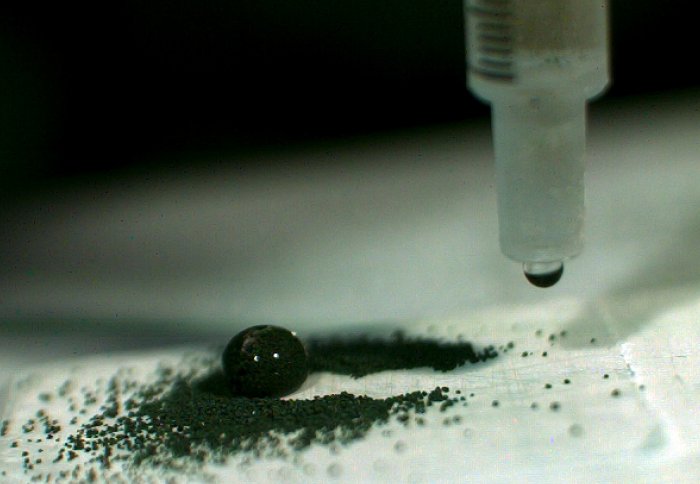New paint makes tough self-cleaning surfaces

Photo: UCL
A new paint coating that makes robust self-cleaning surfaces has been developed by a team of researchers.
The coating can be applied to clothes, paper, glass and steel and when combined with adhesives, maintains its self-cleaning properties after being wiped, scratched with a knife and scuffed with sandpaper.
The study involved researchers from UCL, Imperial College London and Dalian University of Technology (China) and it is published this week in Science. It shows how the new paint, made from coated titanium dioxide nanoparticles, can give a wide-range of materials self-cleaning properties, even during and after immersion in oil and following damage to the surface.
The production of robust self-cleaning surfaces is a key step in ensuring that these highly promising materials can be widely used.
– Dr Colin Crick
Self-cleaning surfaces work by being extremely repellent to water but often stop working when they are damaged or exposed to oil. The new paint creates a more resilient surface that is resistant to everyday wear and tear, so could be used for a wide range of real-world applications from clothing and cars, say the researchers.
Co-author Dr Colin Crick, from the Department of Chemistry at Imperial, said: “The surface coating we developed is not only formed with relative ease, but can also be applied to a wide range of materials. The production of robust self-cleaning surfaces is a key step in ensuring that these highly promising materials can be widely used.”
Extremely water-repellent surfaces cause water to ball into tight droplets. When these roll about on the surface, they pick up dirt, viruses and bacteria, cleaning it without any scrubbing. In this way, a rain shower could clean a car instead of making it dirty.
Different coating methods were used to create the water repellent surfaces, depending on the material. An artist’s spray-gun was used to coat glass and steel, dip-coating for cotton wool and a syringe to apply the paint onto paper.
tough conditions
All the materials became waterproof and self-cleaning as water droplets of different sizes were seen bouncing instead of wetting the surface, removing the dirt applied by the researchers. This was maintained after damage was inflicted on the surfaces.
First author Yao Lu from UCL, said: “Our paint worked extremely well for a variety of surfaces in tough conditions which were designed to simulate the wear and tear of materials in the real-world. For example, car paint frequently gets scuffed and scratched and we wanted to make sure our paint would survive that.”
The experiments were filmed to show the behaviour of the treated surfaces against controls. Examples include videos of treated cotton-wool being dipped into blue coloured water and emerging pristine white with no trace of contamination, and treated paper remaining dry and clean after being exposed to dirt and water.
Co-author, Professor Claire Carmalt at UCL said: “The biggest challenge for the widespread application of self-cleaning surfaces is finding a way to make them tough enough to withstand everyday damage. The surfaces tend to be mechanically weak and so rub off easily, but by pairing our paint with different adhesives, we’ve shown it is possible to make a robust self-cleaning surface. We used materials that are readily available so our methods can be scaled-up for industrial applications.”
See the paint in action at our Fringe event 16 March 2016: The Atoms Family.
‘Robust self-cleaning surfaces that function when exposed to either air or oil’ by Yao Lu, Sanjayan Sathasivam, Jinlong Song, Colin R. Crick, Claire J. Carmalt, and Ivan P. Parkin is published in Science.
Article text (excluding photos or graphics) © Imperial College London.
Photos and graphics subject to third party copyright used with permission or © Imperial College London.
Reporter
Hayley Dunning
Communications Division